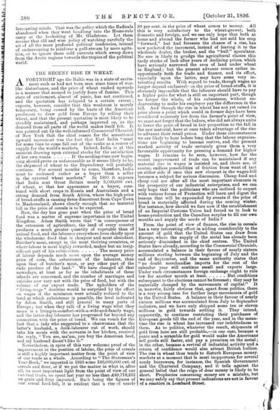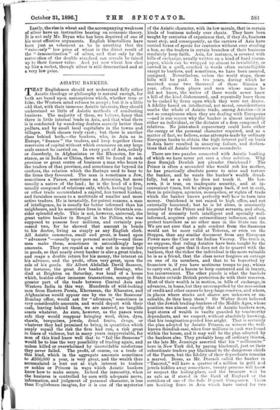THE RECENT RISE IN WHEAT.
AFORTNIGHT ago the Baltic was in a state of excite- ment such as had not been seen since times of war- like disturbance, and the price of wheat rushed upwards in a manner that seemed to justify fears of famine. This state of excitement, almost of panic, has not continued, and the quotation has relapsed to a certain extent ; experts, however, consider that this weakness is merely temporary, being caused by the haste of the American producers to draw gold from Europe by selling their wheat, and that the present quotation is most likely to be steadily maintained, and perhaps improved on, as the demand from all parts of the world makes itself felt. It was pointed out by the well-informed Commercial Chronicle of New York that the chief reason for the sensational upward movement was the fact that East India "must for some time to come fall out of the ranks as a source of supply for the world's markets. Indeed, India is at this moment drawing upon external stocks for the satisfaction of her own wants If the seeding-time now begin- ning should prove as unfavourable as it seems likely to be, the shipment of wheat to the Dependency will probably continue. For several months to come, therefore, India must be reckoned rather as a buyer than a seller in the external wheat markets." In 1895 it appears that India sent Great Britain nearly 9,C00,000 cwt. of wheat, so that her appearance as a buyer, com- bined with short crops in Russia and Australasia and a strong demand from South Africa, where the high price of bread-stuffs is causing fierce discontent from Cape Town to Mashonaland, shows clearly enough that no material fall in the price of cereals is to be expected.
Now, the day has gone past when the price of bread food was a matter of supreme importance in the United Kingdom. Adam Smith wrote that "in consequence of the extension of agriculture, the land of every country produces a much greater quantity of vegetable than of animal food, and the labourer everywhere lives chiefly upon the wholesome food that is cheapest and most abundant. Butcher's meat, except in the most thriving countries, or where labour is most highly rewarded, makes but an insig- nificant part of his subsistence The money price of labour depends much more upon the average money price of corn, the subsistence of the labourer, than upon that of butcher's meat, or any other part of the rude produce of the land." We have changed all that nowadays, at least as far as the inhabitants of these islands are concerned, and the number of marriages and suicides now vary not with the price of food, but with the volume of our export trade. The upholders of the " living-wage " doctrine would be surprised by the effect on wages if the minimum were actually reduced to the level at which subsistence is possible, the level indicated by Adam Smith, and still general in many parts of Europe ; but when they talk of a living wage what they mean is a living-in-comfort-with-a-wife-and-family wage, and the latter-day labourer has progressed far beyond any connection with the price of bread. We can vouch for the fact that a lady who suggested to a charwoman that the latter's husband, a dock-labourer out of work, should take his meals with the servants in her kitchen, received the reply, "You see, ma'am, you buy the American beef, and my husband doesn't like it."
Nevertheless, in spite of this very welcome proof of the improvement in the position of labour, the price of cereals is still a highly important matter from the point of view of our trade as a whole. According to "The Statesman's Year-Book," we imported in 1895 some 180,000,000 cwt. of cereals and flour, or if we put the matter in what is, after all, its most important light from the point of view of our external trade, we spent last year no less than £49,718,252 on grain and flour imported. Such being the figures of our cereal food-bill, it is evident that a rise of nearly of a. reaction m Lombard Street. 50 per cent, in the price of wheat comes to money. All this is very satisfactory to the wheat-grower, both domestic and foreign, and we can only hope that both at home and abroad the farmer who had not sold his crop "forward," but had foreseen the chance of a rise, has now pocketed the increment, instead of leaving it to the wholesale dealer, the broker, and the "bull" speculator. No one is likely to grudge the agricultural classes this tardy stroke of tuck after years of declining prices, which have seriously narrowed the area of land under wheat in England ; but the present advance comes rather in- opportunely both for trade and finance, and its effect, especially upon the latter, may have some very in- teresting results. With regard to trade, though wages no longer depend exclusively on the price of bread-stuffs, it is obviously impossible that the labourer should have to pay a higher price for what is still an important part, though no longer the whole, of his subsistence, without en- deavouring to make his employer pay the difference in the bill. And though the rise in wheat has not yet raised its price above a point which would in former days have been considered ruinously low from the farmer's point of view, we must not forget that the bakers, who did not always unite to lower the price of bread in fair proportion to the fall in the raw material, have at once taken advantage of the rise to advance their retail prices. Under these circumstances we are likely to hear before long that the labour organisa- tions are beginning to become restive, and the present marked activity of trade certainly gives them a very favourable opportunity for pressing a demand for higher wages. It remains to be seen, however, how far the recent improvement of trade can be maintained if any material rise in wages is insisted on, and there are, of course, endless possibilities of friction from want of tact on either side if once this new element in the wages-bill becomes a subject for serious discussion. Cheap food and cheap coal are after all the most important elements in the prosperity of our industrial enterprises, and we can only hope that the politicians who are inclined to coquet with various forms of Protection will learn and digest the lessons that will be expounded by events if the price of bread is materially affected during the coming winter. For instance, how should we fare now if the establishment of an Imperial Customs Union had forced us to look to home-production and the Canadian surplus to fill our own mouths and supply the needs of India ?
From the point of view of finance, the rise in cereals has a very interesting effect in adding considerably to the amount of gold that the United States can draw from Europe, where the supply of the metal has already been seriously diminished in the chief centres. The United States have already, according to the Commercial Chronicle, accumulated a balance in their favour of nearly sixteen millions sterling between the beginning of July and the end of September, and the same authority states that "no doubt merchandise imports for the rest of the calendar year will continue small and exports large. Under such circumstances foreign exchange ought to rule low for another month at least. But conditions subsequent to the elections cannot be forecast; they may be materially changed by the movements of capital." It is, however, fairly obvious that, apart from politics, there is a very strong case for further large movements of gold to the United States. A balance in their favour of nearly sixteen millions was accumulated from July to September inclusive, and we have only shipped some ten or eleven millions in gold towards settling it. They intend, apparently, to continue restricting their purchases of European goods till the end of the year, and in the mean- time the rise in wheat has increased our indebtedness to them. As to politics, whatever the result, shipments of gold from here are still probable,—in one case, because a panic and a scramble for gold would make the Americans sell goods still faster, and pay a premium on the metal ; in the other, because a revival of industrial activity and a return of confidence would also attract British bullion. The rise in wheat thus tends to disturb European money- markets at a moment that is most inopportune for several needy borrowers, for instance, the Spanish Government and the Chartered Company, and it tells against the general belief that the reign of dear money is likely to be short. Prophecies concerning money are a mistake, but we may safely say that present indications are not in favour Lastly, the rise in wheat and the accompanying weakness of silver have an instructive bearing on economic theory. It is not only Mr. Bryan who has been deprived of one of his most effective arguments. English bimetallists have been just as vehement as he in asserting that the g. ruinously " low price of wheat is the direct result of the " demonetisation " of silver, and that only by the restoration of the double standard can cereals be raised up to their former value. And yet now wheat has shot up like a rocket, though silver is still demonetised and at a very low price.











































 Previous page
Previous page